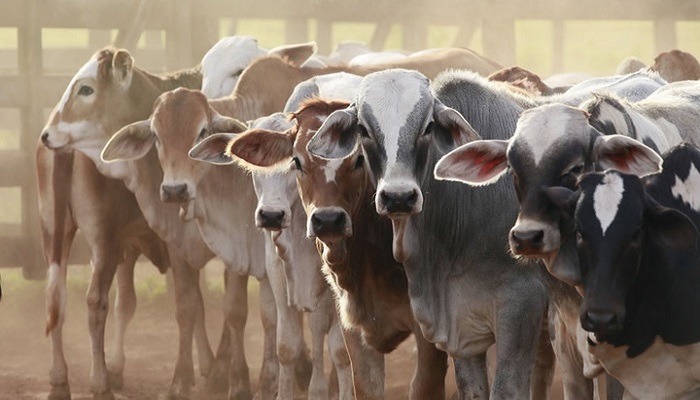Article Summary
- Nigeria heavily relies on dairy imports due to underdeveloped local industry and low milk production of local animals.
- The Nigerian livestock industry is a N30 trillion worth national asset with a growth projection of 1.2% year-on-year by 2026.
- To enhance growth in the industry, there should be collaboration and synergy among stakeholders, adoption of the triple helix model, and a plan to explore the potential of each value chain.
Nigeria’s livestock production sector has great potential for growth despite being a prominent player in Africa. However, the country heavily relies on dairy imports, presenting a challenge that cannot be addressed through conventional approaches. Professor Eustace Iyayi, the Registrar/Chief Executive Officer of the Nigerian Institute of Animal Science, sheds light on the issues and offers potential solutions to enhance production in the sector. Enjoy the conversation.
Nairametrics: A few years ago, you were upbeat about Nigeria’s potential for growth in animal agriculture. Considering the continued activities of bandits and herdsmen, as well as external factors, are you still upbeat?
Prof. Eustace Iyayi: I am as upbeat about Nigeria’s potential for growth in animal agriculture now as I have always been. If you look at the volume of activities in the animal agriculture value chain, you will agree with me that the subsector can energize and propel our economy through employment generation, foreign exchange earnings, and expansion of the processing subsector for the local, regional, and international markets. The activities of the bandits and the clashes have no doubt had a negative impact on the growth of the sector. But with the concerted efforts of the various governments to combat the menace, there has been some improvement in the security situation.
Nairametrics: Dairy products are getting costlier by the day. What is responsible for that?
Prof. Eustace Iyayi: Two main factors are responsible: the underdevelopment of the local dairy industry and the reliance on the importation of dairy products into the country. Nigeria spends $1.5 billion annually on milk importation because 60% of the milk we consume is imported. Though Nigeria has the third largest herd of cattle in Africa, the country has a deficit of about 1 million tonnes of milk, with the production of only about 560,000 tonnes of the 1.56 million tonnes we need.
The reason is that our animals are low milk producers. So, with local production and the need for importation, the prices of dairy products are bound to go up. But recently, the Commercial Dairy Ranchers Association of Nigeria (CODARAN), in collaboration with relevant stakeholders like the Nigerian Institute of Animal Science and the Federal Ministry of Agriculture and Rural Development (FMARD), has made tremendous progress in improving milk production in the country. The recent approval of the National Dairy Policy by the Federal Executive Council (FEC) will go a long way in improving the dairy subsector.
Nairametrics: What is the current value of the entire value chain of the animal industry?
Prof. Eustace Iyayi: The Nigerian livestock industry is a N30 trillion worth national asset.
Nairametrics: What is the growth projection over the next 10 years?
Prof. Eustace Iyayi: By 2026, Nigeria is expected to have a livestock production of 30.2 million heads, a 1.2 per cent growth year-on-year. Since 1966, Nigeria’s supply has gone up by 1.7 per cent each year. Meanwhile, 2021 saw a sharp decrease in the imports of livestock into the country.
Nairametrics: Has the war in Ukraine affected the animal industry in Nigeria?
Prof. Eustace Iyayi: The war in Ukraine has affected animal agriculture with respect to grain supply. No doubt, the war has disrupted the global supply chain once again after the seeming recovery from the devastating effects of COVID-19. The war has caused an increase in the price of wheat and wheat products. These have implications for the livestock industry.
Nairametrics: How can Nigeria navigate that hurdle?
Prof. Eustace Iyayi: The way to navigate the hurdle is to create opportunities that the challenges have thrown up. We should also have a concrete road map for the animal agriculture sector in the country. The time has come for the country to deploy the instruments of research and innovation to advance commerce in all the value chains in our animal agriculture. A nation that cannot commercialize its research cannot develop.
Nairametrics: Do you have any advice for stakeholders in the industry on how to grow the industry: farmers, middlemen, regulators, etc.?
Prof. Eustace Iyayi: There must be collaboration and synergy in the operations of all stakeholders. I advocate the adoption of the triple helix model between research/innovation, industry, and policymakers.
Nairametrics: Is Nigeria self-sufficient in animal products?
Prof. Eustace Iyayi: Nigeria is not sufficient in terms of animal products. Our animal protein consumption is among the least in the world at 45.4 g, compared to the FAO minimum of 53.8g. Thus, we are grossly deficient in animal protein production and consumption.
Nairametrics: What should the incoming administration do to enhance growth in the industry?
Prof. Eustace Iyayi: The incoming administration should regard the animal agriculture sector as a sector that must be handled with technical experts in charge. The administration should have a plan to disaggregate the value and explore the potential of each for employment generation and export. The private sector is the veritable platform for the growth of the sector, and so the government should engage with them at all levels.












